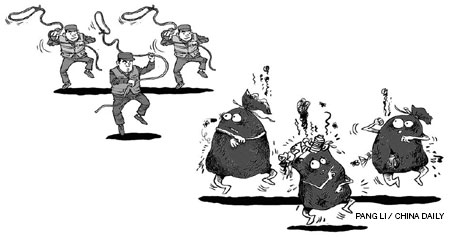How to lay garbage to waste, safely
By He Bolin (China Daily) Updated: 2012-10-12 08:10

China's "Golden Week" holiday (which actually lasted eight days from Sept 30 to Oct 7) once again left the world in awe because of the massive traffic jams on highways, the huge flow of people across the country and, worse, the trash strewn all over in the aftermath.
On the night of Mid-Autumn Festival (Sept 30), tourists who had gathered on a 3-kilometer stretch of a beach in Sanya, Hainan province, to watch the full moon that signifies family reunion, left more than 50 tons of garbage behind. The Palace Museum in Beijing was also full of trash, thanks to the surfeit of visitors during the holiday. Similar scenes have been reported from across the country, especially tourist spots.
The road-toll-free holiday encouraged almost everyone with a car to hit the highways, turning them into long stretches of parking lots with drivers and passengers throwing trash out of their windows at random.
The "Golden Week" holidays are a time for travel, family reunion and relaxation. But some people have turned them into a stressful period for law enforcers and cleaners. The problem can be attributed to lack of awareness of personal and public hygiene among people. This means people's social and health awareness has not kept pace with the country's economic development.
The question that arises is: How can the situation be improved?
Most observers agree that the first step would be to raise people's awareness of hygiene and environmental protection, for which an incentive-and-punishment mechanism has to be put in place.
In the United Kingdom, for example, a person has to pay 48 pounds ($77) to the civic authorities for the disposal of 1 ton of garbage, and the cost will go up by 8 pounds every three years from 2013. Besides, a person can be fined up to 100 pounds for disposing of garbage illegally. As a pilot program, local governments in the UK have installed electronic chips in trash bins to monitor the garbage disposal procedure of 2.6 million families in 68 places.
Such experiences are worth learning from. People will stop dumping garbage wherever and whenever they feel like if they are fined for doing so. And the money collected as garbage disposal fees and fines can make the waste disposal process more efficient.











